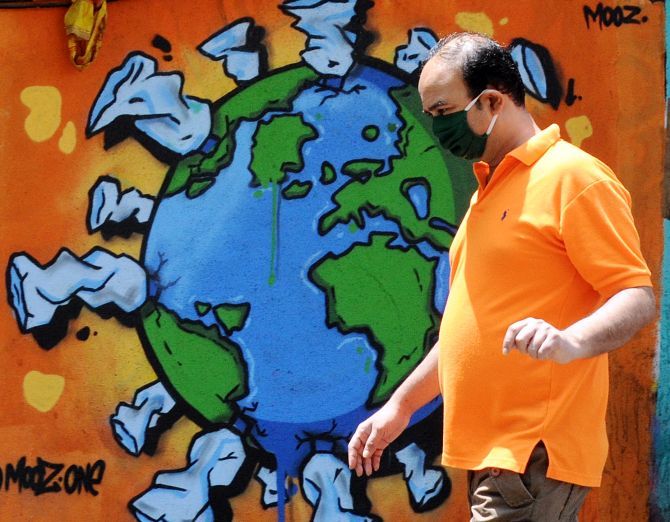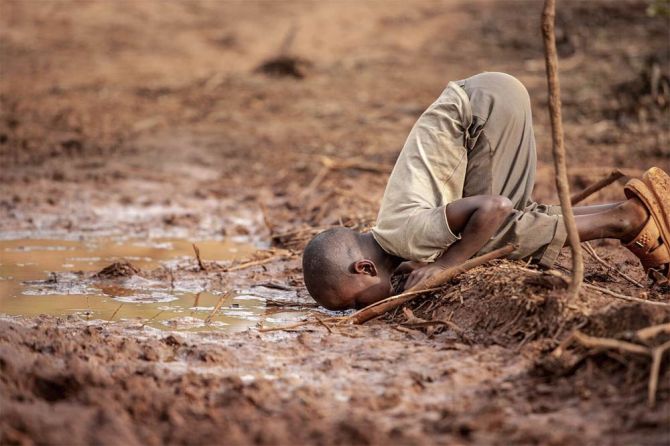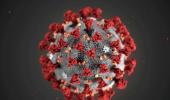'Wild animals lived in their natural environment.'
'So, viruses could not be communicated.'
'Then came mass production and mass quartering of animals -- whether it be poultry, pigs and cattle -- which gave rise to bird flu, SARS and the mad cow disease.'
'Vast amounts of animal produce are also being flown from one part of the world to another, which has helped to spread the virus.'
'All these changes have led to a new and deadly mutation of the virus that has immobliised human beings.'

On World Environment Day, the earth is deeply need of healing.
Professor Vikram Soni, physicist and Professor Emeritus at Jawaharlal Nehru University, believes we need to go back to a more sustainable lifestyle in order to emerge from the COVID-19 pandemic.
"COVID-19 has highlighted how we need to once again create living rural natural habitats that are self-sustaining," Professor Soni -- author of the Naturally - Tread Softly on the Planet -- tells Rashme Sehgal.
What has the COVID-19 pandemic taught us?
Whether it is laboratory made or not, I would like to emphasise that it is definitely a man made pandemic.
Earlier, there was no monoculture or mass production of goods and definitely no supermarkets.
There was a great deal of wilderness and dense forests and the animals which inhabited it existed in natural balance -- all spread out.
Let me put it like this.
Wild animals lived in their natural environment in a state of natural quarantine.
So, in a sense viruses were diluted and could not be communicated.
Then came mass production and mass quartering of animals -- whether it be poultry, pigs and cattle -- which gave rise to birthed bird flu, SARS and the mad cow disease.
Also, human beings entered into much closer liaison with large populations of erstwhile wild animals.
Also, it is important to highlight how vast amounts of animal produce are being flown from one part of the world to another, which has also helped to spread the virus.
All these changes have led to a new and deadly mutation of the virus that has immobliised human beings.
Sixty per cent of new infectious diseases today originate from animals including ebola and the nipah virus and now COVID-19.
How do we ensure this ends?
By not tampering but conserving wild habitats and the animals in them and avoiding mass quartering, production and transport of animals.
Animals need their natural habitat to live in just as we need ours.

There is a pressing demand for deforestation to halt and for half the planet be declared as a nature reserve. Do you see this coming about?
Maybe not half the planet, but definitely one third.
For the rest by designing and creating living rural natural habitats that are self- sustaining for water, soil, milk, renewable energy, health, food and employment we will be able to ensure that we lead more balanced and sustainable lives.
Despite the government and more specifically the ministry of environment knowing the importance of forests and the need to protect them, they have sanctioned infrastructure projects in both the Western Ghats and the forest region of Kerala and the north east which are probably the last pristine forests left in our country.
This shows the profound misunderstanding of our government and heralds imminent disaster in the slightly longer term than that of an election.
The solution is to preserve our forests, rivers wilderness which provides enormous and invaluable life (ecosystem) services.
Not to destroy them for short term economic gain and growth which is responsible for climate change and COVID-19.

How do we tackle this complete lack of sensitivity and understanding shown by our law givers and so called protectors who have gone ahead and given a green signal at a time when scientists point out the key reason for this pandemic is the increasing deforestation?
There is a criminal lack of understanding how to find solutions to such emergencies both in our government and courts.
We as a society must educate and stop them.
Perhaps through an independent commission that will ensure this natural wealth remains safe for future generations.
There is a demand for global supply chain production to change with nations opting for nearshore production. Is that possible at a practical level. Will existing governments and corporates agree to this?
Not as yet, but they will have to do so to create a sustainable future for the plant.
Those who start now will be the pioneers and gainers in every sense of the term.

Climate change is upon us. Our government has lived in denial but we have witnessed two cyclones (Amphan and Nisarga) in quick succession in the last fortnight.
The NCR region is witnessing minor earthquakes every day and experts warn of a major one in the near future.
What does this indicate?
Extreme events like cyclones are a likely consequence of global warming.
I do not think climate change and earthquakes have anything to do with each other.
COVID-19 has adversely impacted the global economic order. But in your essay The Global Dilemma, you talk about how the scale of technological interactions in the planet have now become unsustainable. Please elaborate on this.
Today we have a new situation where the scale of our interventions and technology has exceeded the scale of the planet.
This has had dire and unpredictable consequences like climate change and COVID-19.
But before I reply to your question, I would like to point out that we must first understand the role of global identities in evolution.
The air is a global identity that acts as a safety net for the planet.
When there is forest fire, within a few days the toxic air around the fire is dispersed throughout the planet, diluted to miniscule proportions and the charred forest regenerates with good air and rain.
If the bad air was not dispersed, all life, trees, plants, insects and animal life would be dead leaving behind a lifeless terrain.
Another global identity, the oceans, handle our organic waste in the same way.
The living planet is a symbiotic and homeostatic network that steadies spaceship earth every day, much like our metabolism does so for us.
The lesson is that global identities have to be safety nets unlike the global market economy which is a global profit net to fuel unmanageable consumption that is killing the planet.
The profit net cannot play a restorative role.
The planet today is in need to restoration and healing. This is the polar opposite of GDP growth.

Global markets are profit driven. You talk about over production and over consumption and our existing unsustainable lifestyles. But people's livelihoods and jobs revolve around the prevailing economic order?
Today's global market is fuelled by profit, which depends on sales which in turn depend on products, hence technology.
Technology is the embodiment of our creative scientific advance, but today's tech does not take account of its fallout.
Invention for the sake of invention and for profit, is not sustainable; it is irreversibly making waste of the planet and downloading an abundance of non recyclable waste that is choking the planet.
Companies like Apple, Facebook and Microsoft have a combined turnover that exceeds even the GDP of India.
With planned obsolescence to augment profit and sales they are mounting e-waste on the planet.
They must transform to total recycling as practiced by nature which has no waste - planet social responsibility.
Strangely, these knowledge hubs have not noticed that the largest production system is Nature which has no waste!
A human being is healthy when there is a balance, an equilibrium.
The object of our living scheme should be to maintain a balance -- a healthy steady state and not reckless growth.
The same applies not only to our economies, but our cities and our consumption.
What we want is quality of life -- good air, food, water, natural soil and food.
Intoxicated by our inventions we have made the cardinal mistake of electing higher consumption and standard of living over quality of life.
COVID-19 has highlighted how we need to once again create living rural natural habitats that are self-sustaining.
It is these non-invasive self sustaining habitats which use 'Conserve and Use' solutions and it is these that will be economically more viable and beneficial in the long term.
You talk about creating a more harmonious relationship between nature and human beings but how can we bring this about?
We must do so by changing our priorities.
All freedom has to be practiced with responsibility and self restraint.
I don't want to sound philosophical, but we need to act keeping in the mind that the earth has a right to remain healthy.
We must also keep in mind that every society must remain equitable.
By not making waste of the planet and dumping unrecyclable waste on the planet, whether it be carbon dioxide, plastic or untreated sewage, we are destroying the planet irreversibly.
You talk about reducing global profit driven economies. How can this come about given our obsession with money and technology?
Non invasive self sustaining natural habitats which use "Conserve and Use" solutions can be economically more viable and beneficial in the long run.
You talk about how the inner metabolism of the earth has been disturbed? Please elaborate on this.
Moving back to the larger picture, the millennium report indicates that in the last 50-odd years, 60 per cent of the world's ecosystems have degraded significantly and are showing terminal stress, as over 60 per cent of the wild species on land, rivers and the sea are on the verge of extinction.
Not so coincidentally, this was accompanied by a rather alarming accumulation of wealth by the richest 1 per cent of the world, which now holds almost 60 per cent of its wealth.
It must be considered that it is in the last half-century that this has come to pass which is the span in which urbanisation has really intensified.
Much of this has come from the heightened consumption that identifies with the high standard of living of the more urban developed world.
So maybe we have lost our way with our technological fixation, now that we are seeing the fall out.
Why? We have not invented any technology that does not make waste of the planet by digging it out and then dump all its waste on to this very planet.
The living planet, the biosphere, has become a techno-cemetry.
Can human ingenuity not do better? One does not have to look too far - just a peep into nature's vast and encompassing production system shows that that there is no waste in nature.
Everything gets recycled but we haven't learnt from that.
We have had time -- over 200 years from the industrial revolution.
Can we not invent non-invasively with sensibility and recycling.
Of course, we can.

You have been a proponent for non-invasive living? Is that at all practical?
It is the only choice if we are to have a future and it is not hard if we change our greed and conspicuous consumption and move to self sustaining natural habitats.
In order to tackle the coronavirus, India needs assured supplies of water which we do not have given the extreme shortage of pure water supplies left in our country. How do we tackle this?
We need quality water sources for health.
Contaminated water can carry many diseases including deadly viruses.
As of now, 75 to 80% of all our surface water (river and lakes) and groundwater is polluted in India.
The only good water sources left are underground aquifers below forests and around the unencroached floodplains of our rivers.
We must ensure these remain pristine and unpolluted.
Rashme Sehgal has had a long career in journalism and worked for The Times of India, The Indian Post among other newspapers.
Production: Aslam Hunani/Rediff.com










